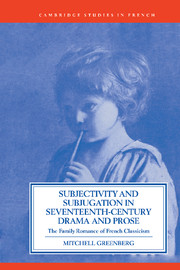 Subjectivity and Subjugation in Seventeenth-Century Drama and Prose
Subjectivity and Subjugation in Seventeenth-Century Drama and Prose Published online by Cambridge University Press: 16 October 2009
Our expectation is therefore directed towards two other possibilities: that the social instinct may not be a primitive one and insusceptible of dissection, and that it may be possible to discover the beginnings of its development in a narrower circle, such as that of the family.
(Freud, Group Psychology, p. 2)In the general revolution of sensibility that occurred during the seventeenth century, the modern “subject,” characterized most forcefully as a “psychological” interiorized being, as a privatized sense of the self, was given its first delineation. The central concern of this book will be to trace this delineation in the relation between French Classical literature (particularly, but not exclusively, dramaturgy) and the representation of the “family” as the mediating locus of a patriarchal ideology of sexual and political containment. Concurrently this study attempts to adumbrate the relation between sexual/political constraints, the ideology of the subject (the subjugation and the subjectivization of the individual) and the creation of a literary “canon” that represents and naturalizes this subjugation. Here, in defense of my privileging of literary texts in the analysis of the workings of seventeenth-century (French) ideology, even if I do not necessarily share his particular definition, I must appeal to Terry Eagleton, who has so vigorously argued for viewing literature as the prime object of such analysis. “Literature,” he writes, “"is the most revealing mode of experiential access to ideology that we possess. It is in literature, above all, that we observe in a peculiarly complex, coherent, intensive and immediate fashion the workings of ideology in the texture of lived experience ...”
To save this book to your Kindle, first ensure [email protected] is added to your Approved Personal Document E-mail List under your Personal Document Settings on the Manage Your Content and Devices page of your Amazon account. Then enter the ‘name’ part of your Kindle email address below. Find out more about saving to your Kindle.
Note you can select to save to either the @free.kindle.com or @kindle.com variations. ‘@free.kindle.com’ emails are free but can only be saved to your device when it is connected to wi-fi. ‘@kindle.com’ emails can be delivered even when you are not connected to wi-fi, but note that service fees apply.
Find out more about the Kindle Personal Document Service.
To save content items to your account, please confirm that you agree to abide by our usage policies. If this is the first time you use this feature, you will be asked to authorise Cambridge Core to connect with your account. Find out more about saving content to Dropbox.
To save content items to your account, please confirm that you agree to abide by our usage policies. If this is the first time you use this feature, you will be asked to authorise Cambridge Core to connect with your account. Find out more about saving content to Google Drive.